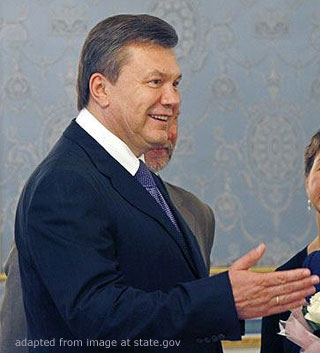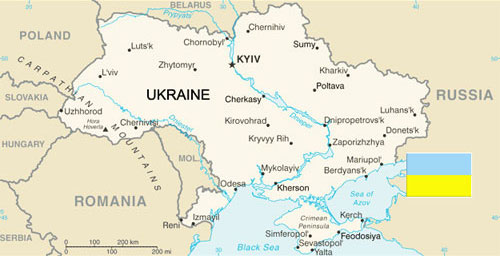Yanukovych kills off amnesty bill compromise as oligarch rebellion grows

(Business New Europe – bne.eu – January 30, 2014) Ukrainian President Viktor Yanukovych visited the Rada for the first time in two years on January 29 to enforce discipline over the Party of Regions and added conditions to an amnesty bill that in effect killed any chance of a compromise with the opposition to end the fighting.
The dramatic events in the Rada also highlighted growing tensions inside the pro-government Party of Regions, as some of the leading oligarchs are almost in open rebellion. It has also set the stage for the use of force when the waiting period of 15 days for the anmesty’s conditions to be met expires.
The US intelligence chief has warned the embattled Ukrainian president “is “firmly intent” on holding on to power. National Intelligence Director James Clapper said that Yanukovych will likely resort to violence, illegal acts and other tactics to ensure his re-election in 2015, reports the Kyiv Post.
The Rada was voting on a bill to grant a blanket amnesty to all the protestors in Ukraine. The Rada repelled most of the so called “dictator’s law” on January 28 that imposed harsh new restrictions on public protest. However, granting an amnesty to all protestors, who remain technically in breach of the new laws, is a key part of the opposition’s demands to bring the unrest to an end.
But the meeting didn’t go well. The session dragged into the night after multiple backroom meetings amongst the factions. Finally, Yanukovych himself turned up to enforce discipline on his own Party of Regions.
As he entered the building a journalist harangued him as he walked into the Rada shouting “How many more people have to die?!” But he ignored the questions.
Reporters in the building say that Yanukovych met with leaders of the Party of Regions in the basement of the building ahead of the vote and heard shouting. It appears that many of the Party of Regions deputies wanted to pass the bill as it was submitted as an unconditional blanket amnesty.
Increasingly it appears the Ukrainian president is struggling to maintain control over his party and the oligarchs that have been supporting him until now are starting to rebel. Going into the amnesty vote, news agency UNIAN reported that 52 Party of Regions MPs were ready to support opposition-led amnesty law as it stood, about a fifth of all Regions deputies.
Concorde Capital’s Zenon Zawada reports that it was only thanks to Ukraine’s richest man Rinat Akhmetov and billionaire businessman and former deputy PM Serhiy Tihipko both leaders of factions within the Party of Regions that support the president — the country is not now under a state of emergency that would ensure an escalation of violence.
“The Presidential Administration led by Andriy Klyuyev attempted to convince the Party of Regions parliamentary faction on Jan. 28 to support a state of emergency scenario, former faction member Inna Bohoslovska told the 5 Kanal news network on January 28. The proposal was rejected by 40 MPs loyal to Rinat Akhmetov and 38 MPs loyal to Serhiy Tihipko,” Zawada said in a note to clients on January 29.
The amnesty bill was finally passed, but with lots of conditions attached that in effect calling for protestors to immediately dismantle their barriers and withdraw, which almost guarantees its rejection by the protestors on the street.
“Party of Regions has just started new round of revolution… many tires will be burned on Hrushevskogo this night,” tweeted Kateryna_Kruk an aide to an opposition deputy, who has become one of the unofficial spokespeople for the protest movement.
“The amnesty law gives #euromaidan 15 days to leave the city center. There is no way that is going to happen. Violence 4 sure,” added Bruce Springnote via Twitter, another commentator on the ground.
The revolt inside the Party of Regions may run even deeper. Zawada speculates that the oligarchs may have had a hand in the resignation of Prime Minister Mykola Azarov at the start of this week: “Not only were Akhmetov and Tihipko instrumental in preventing a state of emergency being implemented, but it’s quite possible they played a role in Azarov’s resignation. Nevertheless, his ouster offers little to celebrate for those interested in Ukraine’s EU integration. Yanukovych intends to remain as president for as long as possible, offering the prime minister post to opposition leader Arseniy Yatsenyuk as part of a trap that was wisely resisted.”
“Akhmetov’ deputies no longer follow the Regions party whip, and can no longer be relied upon by Yanukovych. The comments were also quite a remarkable admission that they had not previously voted by parliamentary procedures – the opposition had complained that both the 2014 budget bill and the passage of anti demo laws on January 16 were not approved as per the constitution, while there was also some suspicion over Azarov’s prior victory in a parliamentary no confidence motion which failed in December,” Tim Ash of Standard Bank said in a note. This revelation only underline’s the increasingly illegal methods that Yanukovych is using to run the country.
The EU’s top diplomat Catherine Ashton was in Kyiv during all this, but played no role as the EU once again chose to stand on the sidelines during the crucial showdown in the Rada. She instead spent her time “meeting young people” and being “very worried about people who appear to be missing.”
In the meantime the situation continues to grow more complicated. In Ukraine’s east, pro-government forces have rallied and are actively protecting some regional government offices against attack from pro-Maidan forces.
At the same time there are increasing number of reports of purely anti-Maidan groups forming that are not necessarily pro-government but object to the Kyiv crowd dictating policy to the rest of the country.
Finally, the protestors said on January 29 they were going to set up a “people’s militia”, which suggests the crowds in the capital are preparing to militarise themselves.
Bottom line is that by watering down the amnesty bill and making it unacceptable to the protestors, Yanukovych has ensured no resolution will be reached anytime soon and has actually increased the chances of an escalation in the violence.

